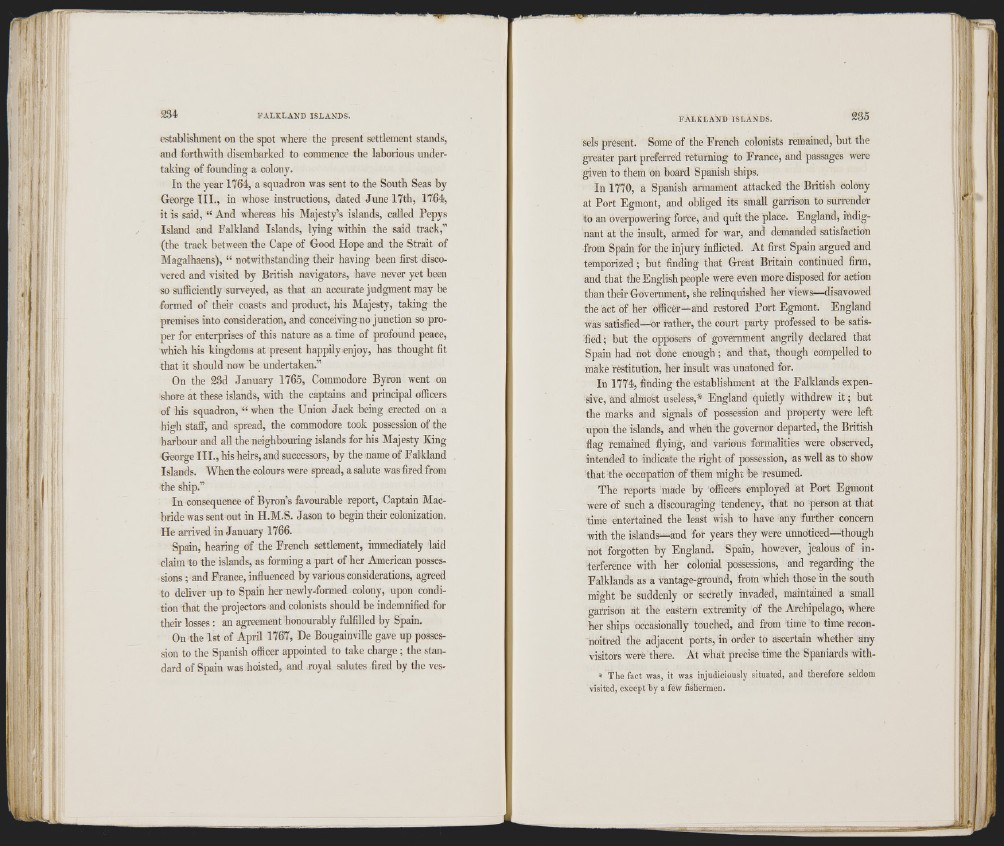
. ’I ii
I.
: I :
il . ; t 7 I
■ if ■
’■ '(<
HI 1
■ .ff
establishment on the spot where the present settlement stands,
and forthwith disembarked to commence the laborious undertaking
of founding a colony.
In the year 1764, a squadron was sent to the South Seas by
George I I I ., in whose instructions, dated June 17th, 1764,
it is said, “ And whereas his Majesty’s islands, called Pepys
Island and Falkland Islands, lying within the said track,”
(the track between the Cape of Good Hope and the Strait of
Magalhaens), “ notwithstanding their having been first discovered
and visited by British navigators, have never yet been
so sufficiently surveyed, as that an accurate judgment may be
formed of their coasts and product, his Majesty, taking the
premises into consideration, and conceiving no junction so proper
for enterprises of this nature as a time of profound peace,
which his kingdoms at present happily enjoy, has thought fit
that it should now be undertaken.”
On the 23d January 1765, Commodore Byron went on
shore at these islands, with the captains and principal officers
of his squadron, “ when the Union Jack being erected on a
high staff, and spread, the commodore took possession of the
harbour and all the neighbouring islands for his Majesty King
George I I I ., his heirs, and successors, by the name of Falkland
Islands. When the colours were spread, a salute was fired from
the ship.”
In consequence of Byron’s favourable report. Captain Mac-
bride was sent out in H.M.S. Jason to begin their colonization.
He arrived in January 1766.
Spam, hearing of the French settlement, immediately laid
niaim to the islands, as forming a part of her American possessions
; and France, influenced by various considerations, agreed
to dehver up to Spain her newly-formed colony, upon condition
that the projectors and colonists should be indemnified for
their losses : an agreement honourably fulfilled by Spain.
On the 1st of April 1767, De Bougainville gave up possession
to the Spanish officer appointed to take charge ; the standard
of Spain was hoisted, and royal salutes fired by the vessels
present. Some of the French colonists remained, but the
greater part preferred returning to France, and passages were
given to them on board Spanish ships.
In 1770, a Spanish armament attacked the British colony
at Port Egmont, and obliged its smaU garrison to surrender
to an overpowering force, and quit the place. England, indignant
at the insult, armed for war, and demanded satisfaction
from Spain for the injury inflicted. At first Spain argued and
temporized ; but finding that Great Britain continued firm,
and that the English people were even more disposed for action
than their Government, she relinquished her views—disavowed
the act of her ofiicer—and restored Port Egmont. England
was satisfied—or rather, the court party professed to be satisfied;
but the opposers of government angrily declared that
Spain had not done enough ; and that, though compelled to
make restitution, her insult was unatoned for.
In 1774, finding the estabhshment at the Falklands expensive,
and almost useless,* England quietly withdrew i t ; but
the marks and signals of possession and property were left
upon the islands, and when the governor departed, the British
flag remained flying, and various formalities were observed,
intended to indicate the right of possession, as well as to show
that the occupation of them might be resumed.
The reports made by officers employed at Port Egmont
were of such a discouraging tendency, that no person at that
time entertained the least wish to have any further concern
with the islands—and for years they were unnoticed—though
not forgotten by England. Spain, however, jealous of interference
with her colonial possessions, and regarding the
Falklands as a vantage-ground, from which those in the south
might he suddenly or secretly invaded, maintained a small
garrison at the eastern extremity of the Archipelago, where
her ships occasionally touched, and from time to time reconnoitred
the adjacent ports, in order to ascertain whether any
visitors were there. At what precise time the Spaniards with-
« The fact was, it was injudiciously situated, and therefore seldom
visited, except by a few fishermen.
P i